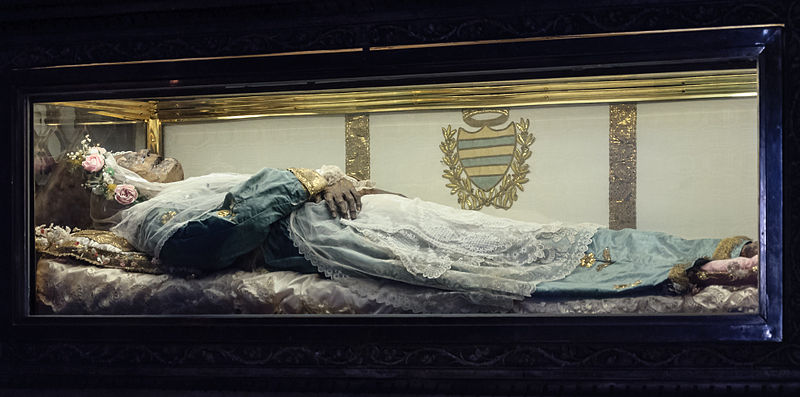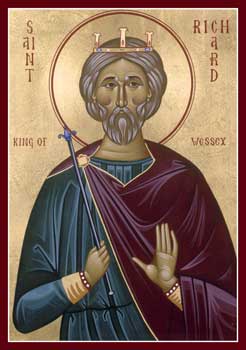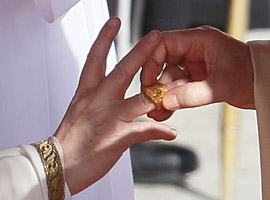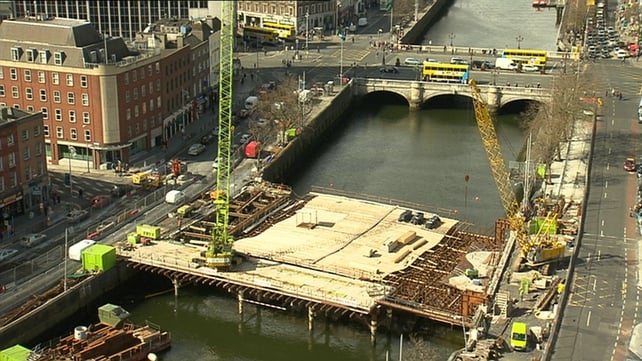
Here we go again! I'm really getting tired of this. I'm not tired with Francis or what he says, perhaps not crazy about the way he does some things; but I deeply admire his easy approach to the Papacy and his obvious piety. Of course he challenges, as he should, just as long as he is being challenged himself - the first person a priest must preach to is himself: and it is obvious Francis walks the talk.
No, I am tired with the way this pontificate has fallen prey to the ideologies of the media and dissenting Catholics who are now using a simple and pious Pope to further their old, tired agendas. And tonight, as I write, the greatest abuse of this Papacy has just taken place - the media have utterly distorted and taken out of context an interview the Holy Father has given.
The headlines are proclaiming that the pope says the Church is obsessed with abortion, gay marriage and contraception - rather than go into detail, I'll just link you to The Irish Times which can always be trusted to distort a Catholic story. As you see, according to this paper, the pope rejects this "obsession". So, we are told, Francis is, apparently, distancing himself from the Church's teaching on abortion, contraception and gay marriage.
Now read what he actually said - see the interview here. And this is the statement the secular media are basing their headlines on:
"We cannot insist only on issues related to abortion, gay marriage and the use of contraceptive methods. This is not possible. I have not spoken much about these things, and I was reprimanded for that. But when we speak about these issues, we have to talk about them in a context. The teaching of the church, for that matter, is clear and I am a son of the church, but it is not necessary to talk about these issues all the time.I have emphasised the word "only" which puts the quotation in context. He is not saying that we abandon our pro-life work, but that we be balanced - that our living of the Gospel, our Christian discipleship should be as radical as our counter-cultural work for life in the culture of death. We do not follow dogmas for the sake of slavish obedience, we live the Christian faith as real disciples, a faith that finds expression in the dogmas. Pope Benedict often spoke about that: we live with Christ.
No one ever died for a dogma, someone once said, the martyrs died for love. St Thomas More did not die for the dogma of the primacy of the Pope, he died for love of Christ within which he understood and accepted the primacy of the Pope as Christ's Vicar who is the symbol of the Church's communion. Subtle difference? Perhaps. But a vital one: one the media does not get. Remember, as one journalist once told me: a lot of journalists are lazy - they go for the headline and, if they get things wrong, or distort the truth it matters little, certainly when dealing with the Church which rarely if ever defends herself and when she does, well, no one listens to her: the story has already poisoned the waters.
It is in the context of our faith that we Catholics speak about abortion, gay marriage and contraception; and the context of human dignity (which he speaks about in an earlier paragraph in the interview) - these things offend and destroy human dignity as experience show us time and time again.
Note I also emphasise the line where Francis makes it clear that is a faithful son of the Church - he accepts Church teaching on these issues and he is not going to change it.
He also speaks about the moral edifice of the Church collapsing because it has lost the freshness and fragrance of the Gospel - that, I'm sure, is a reference to the vision of Pope Innocent III who saw St Francis saving the Church from destruction. The Pope is correct here too. The Church's edifice may seem to fall if it is jaded, and that is why God sends reformers and Saints. But these reformers and Saints live within the communion of the Church, obedient to Christ and his teaching, not seeking to overthrow it and replace it with "mere human teaching", as the "spirit of Vatican II" crowd is trying to do. St Francis who helped reform the Church in the 13th century was a faithful son of the Church, and if he were around today he would be compassionate, working with the poor and the sick: but he would not be escorting women into abortion clinics as some nuns do, nor publicly denouncing the Magisterium (Church teaching) as some priests do.
And lest our critics think the Church will fall, as some journalists this evening are suggesting: she won't - Christ himself has said that she will not fall. Nor will she stop preaching the Gospel - a good, subjective course on Church history will provide plenty of examples. She gets lazy and gives into the world, and then something happens, like the collapse of secular society or the emergence of great reformers like Francis, Ignatius, Teresa of Avila, John Paul II, and new renaissance begins, a restoration of faith and a renewal in the context of the Gospel.
But at this stage all this is now academic: the distorted message is going right around the world and the media continue to use Francis to further their own agenda. It is obvious that for the rest of his pontificate, Francis is going to be used: his statements will be presented out of context, his defence of the faith ignored and his "failure" to change Church teaching presented as his failure to overcome a nasty, entrenched right-wing Curia which scuppered every attempt at "reform". Should he die suddenly, of a heart attack or something, then he was murdered.
What do we do with all this? "Endure" comes to mind. We've had it all before with Blessed John XXIII who, if you listen to some commentators, was almost a free-loving hippy, smashing Church doctrines as he tried to convert us all into Buddhist Unitarians. Though this view of John is shared by the "spirit of Vatican II" lot and the extreme Traditionalists, it is inaccurate. Francis Phillips of The Catholic Herald thinks the media will eventually fall out with the Pope (perhaps if he decides to dispense procedure and canonise Pope Pius XII that may well happen).
Perhaps, but to be honest, I'm not sure. The pessimist in me thinks we'll just have to sit this one out, do our best to report what the Pope is actually saying, knowing that perhaps we have lost this one. Certainly the Pope needs to be made aware of how the media distorts what he says, if he doesn't know already, and how this affects the Church and her members. Sometimes in the way he says things he leaves himself open to be misquoted and distorted. In the meantime we also need to encourage Catholics to read what the Pope actually says, to remind them that they cannot believe everything they read or hear about in the media, especially when it comes to the Church.
All that said, great damage has been done to the Church tonight, old myths have been reinforced and the Church's work for the dignity of the unborn has been undermined. The world now thinks the Pope has rebuked us for holding to the moral law and that may well have consequences for all of us. I cannot help but wish that the Pope had been a little more prudent in the way he spoke. I will not be surprised if this evening many Catholics are angry and upset with the Holy Father, and they cannot be blamed for that.
UPDATES:
Fr Z has an interesting initial response. I cannot help but agree with him when he says: "As you read the interview, and media coverage of the interview, you will find – and this is consistent with Pope Francis’ style of talking off-the-cuff – some truly quotable quotes, leap-out quotes that sit up and beg to be taken out of context." Also his suggestion that the creation of a "virtual Francis" is taking place sounds right. On that issue, Elizabeth Scalia has an interesting piece. She wonders if the world is making an idol out of Francis; one, perhaps, to push a certain agenda.
Fr Dwight Longenecker has a very thoughtful piece in response to the Pope's interview. It is worth reading.
And Brantly Millegan has taken sixteen quotations from the interview for our reflection, revealing in a concise manner what the Pope actually says in the interview rather than what the media wants him to say.
Fr Dwight Longenecker has a very thoughtful piece in response to the Pope's interview. It is worth reading.
And Brantly Millegan has taken sixteen quotations from the interview for our reflection, revealing in a concise manner what the Pope actually says in the interview rather than what the media wants him to say.
















